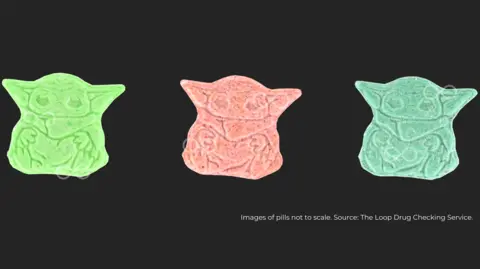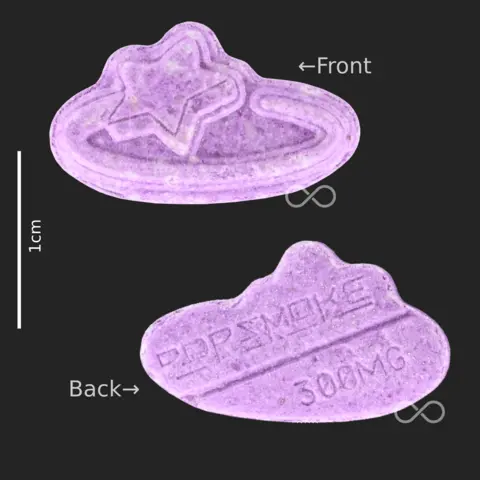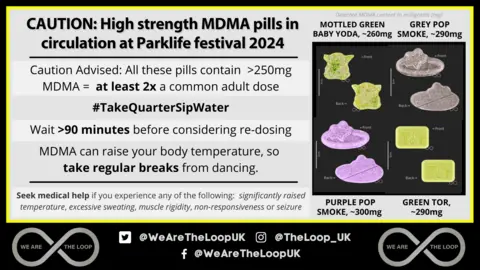By Jared Evitts, BBC Newsbeat
 The Loop
The LoopA drug testing charity has warned festival-goers that potentially deadly super-strength MDMA pills are being sold in the UK.
The Loop, based in Bristol, conducted tests in the city and at the recent Parklife festival in Manchester.
CEO Katy Porter told BBC Newsbeat the charity checked more than 150 pills sold as MDMA, and found the average strength had increased since last year.
She said some had effectively contained a “double dose” of the substance, and this posed a “much greater risk of overdose and potential fatalities”.
This was the highest strength recorded by The Loop since the start of the Covid-19 pandemic, and Katy said this was a particular concern in the current hot weather.
She said drugs increase body temperature, and “dancing and being out and possibly dehydrated” adds to the risk.
The Loop says it doesn’t condone or endorse drug-taking, but wants people to have as much information as possible about the ones that are available.
 The Loop
The LoopThe charity said the average strength of pills tested last year was “around 140mg”.
This has risen to 180mg this year, with one in ten drugs tested being above 250mg in strength, it added.
Katy said one of the most important findings during its tests was the wide variation in pill strengths.
“It’s important to remember that even if a drug looks the same, it doesn’t mean that it is the same,” she said.
“It may not be what has been previously taken, previously sold to you.”
Katy told Newsbeat that younger and less experienced users were the ones at most risk from taking a high-strength pill without realising.
“I think it can sometimes be thought that a pill is a single dose,” she said.
“Therefore, when someone is considering taking MDMA pills, it’s really important that one pill isn’t considered to be one dose.”
She said it was important for information to be available over festival season because the drug market constantly changes, and testing helps to keep people up to date.
How does festival drugs testing work?
 The Loop
The LoopDrug testing at festivals is part of an approach known as harm reduction.
Organisers and police will try to stop drugs getting in, but most agree it’s almost impossible to stop it from happening at all.
On-site testing is done “back-of-house” using confiscated drugs or substances left in amnesty bins.
If testers find that something is potentially dangerous – stronger than usual, contaminated, or sold as something it’s not – they’ll put a warning out to festival-goers.
Studies by The Loop have suggested drug-checking can reduce deaths.
Another method, called front-of-house testing, is where people can take drugs to be tested to make sure they’re safe.
It’s been trialled but has less support from authorities. The boss of Leeds and Reading Festivals has previously said he was concerned it could give people false confidence.
Festival drug testing in 2024
Drug testing was absent at many UK festivals last year in a row between organisers and the government over licences.
Event bosses, including Parklife’s Sacha Lord, accused it of doing a “dangerous U-turn” on the issue.
But the Home Office, which is in charge of drugs policy, insisted its position hadn’t changed.
It maintained that stance when it announced earlier this year that it had issued testing licences under strict conditions for the 2024 festival season.





